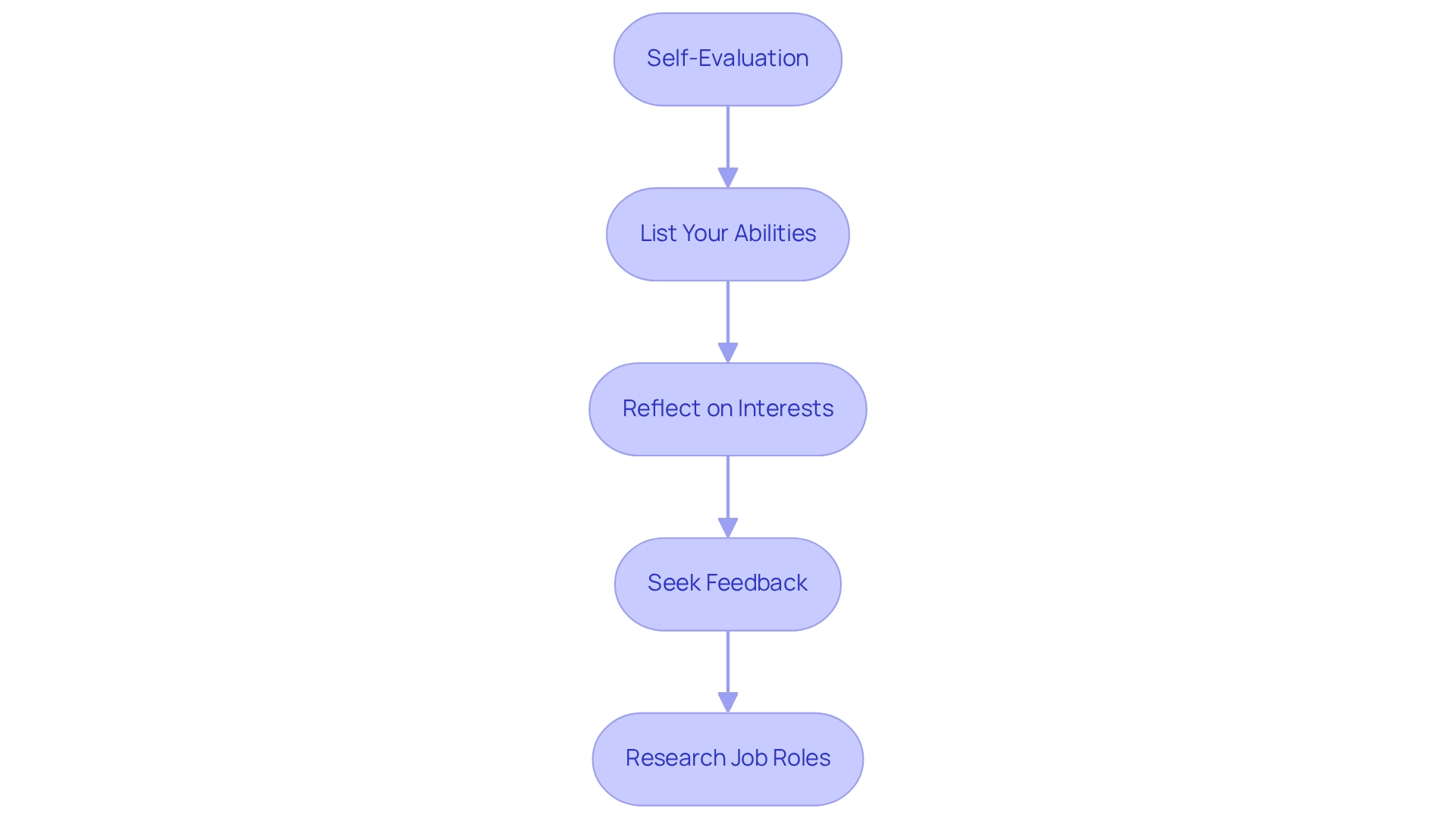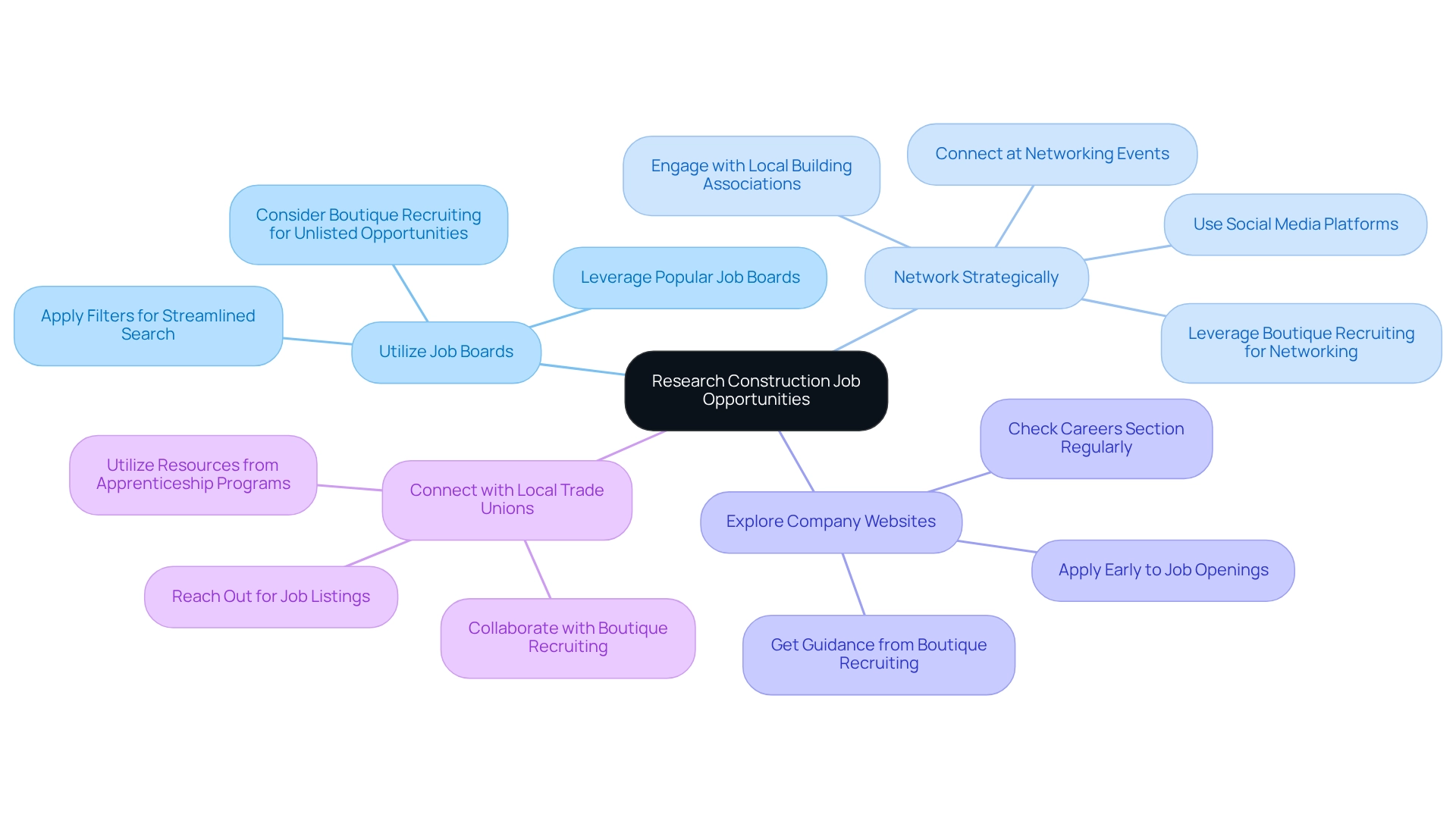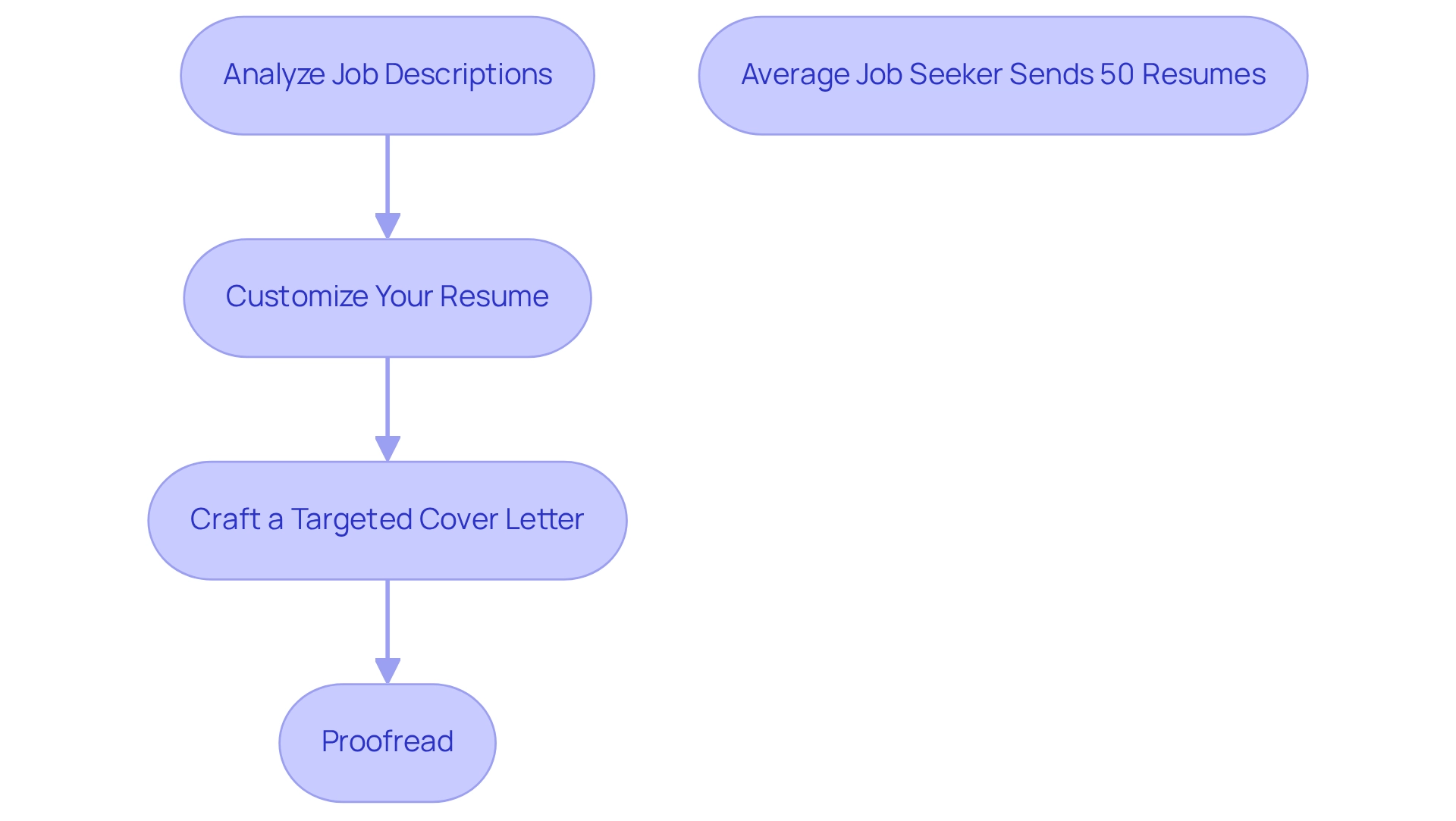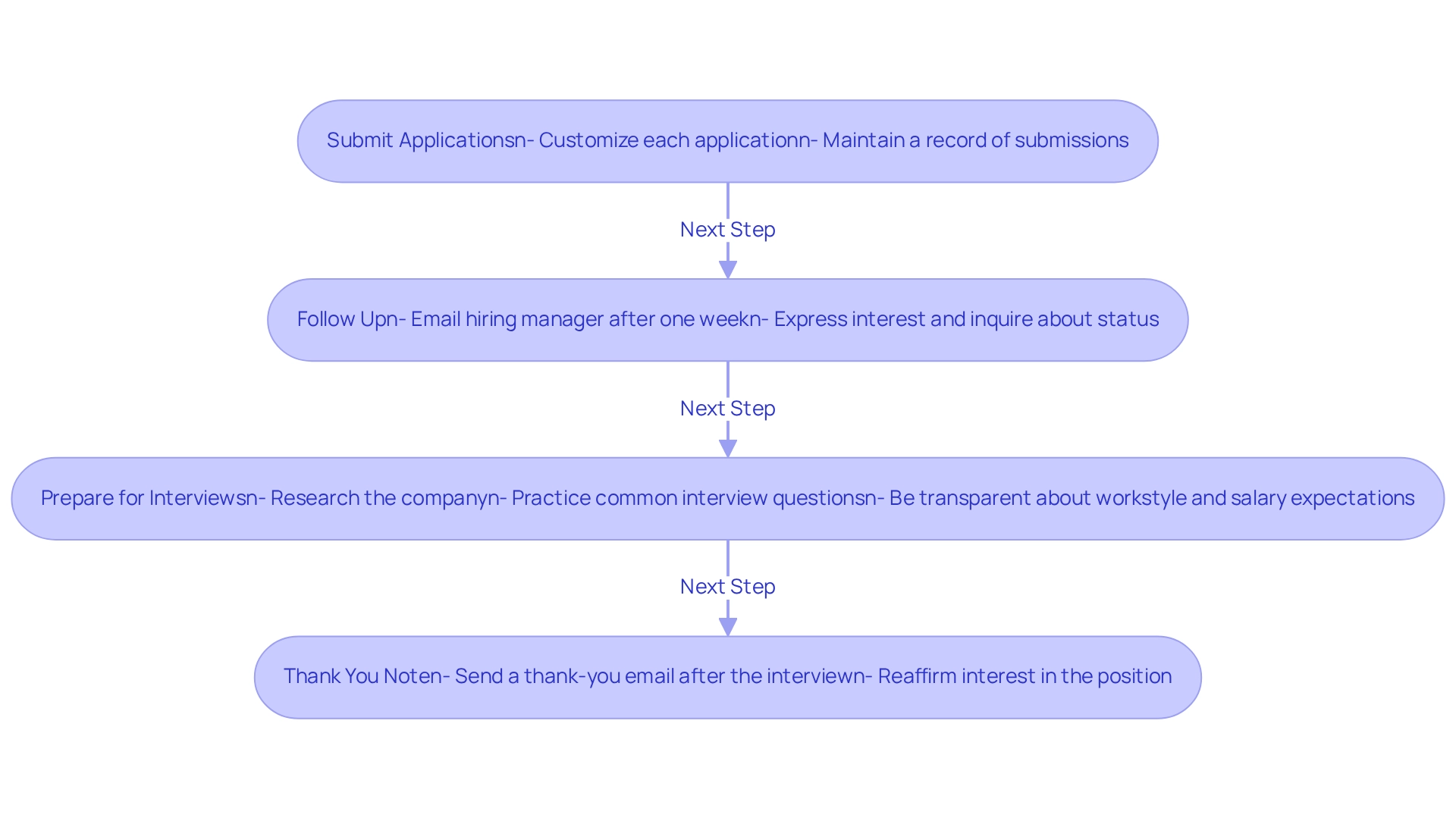Overview
The article delineates four crucial steps to secure construction jobs currently available, underscoring the significance of:
- Self-evaluation
- Thorough research
- Tailored applications
- Proactive follow-up
It articulates how identifying pertinent skills and interests, leveraging job boards alongside networking opportunities, customizing application materials, and maintaining effective communication with hiring managers can substantially elevate a candidate’s prospects in a competitive job market, particularly one influenced by federal infrastructure investments and shifting industry demands.
Key Highlights:
- Conduct a self-evaluation to identify hard and soft skills relevant to construction.
- Reflect on personal interests in construction, such as hands-on work, project management, or design.
- Seek feedback from colleagues or mentors to gain insights on strengths and areas for improvement.
- Research various construction job roles to align skills with industry demands, especially in light of significant federal infrastructure investments.
- Utilize job boards and networking to find job opportunities, as many positions may not be advertised widely.
- Regularly check company websites and connect with local trade unions for job listings.
- Tailor resumes and cover letters by analyzing job descriptions and incorporating relevant keywords.
- Follow up with hiring managers after submitting applications to express continued interest.
- Prepare for interviews by researching companies and practicing responses to common questions.
- Send a thank-you note post-interview to reaffirm interest and professionalism.
Introduction
In the rapidly evolving landscape of the construction industry, job seekers must navigate a complex environment marked by technological advancements and shifting demands. With a surge in job openings and a competitive market, aligning personal skills and interests with available opportunities has never been more crucial.
This article provides a comprehensive guide for aspiring construction professionals, detailing effective strategies for:
- Self-assessment
- Job research
- Tailored applications
- Follow-up techniques
By embracing these insights, candidates can enhance their prospects and secure rewarding positions in a sector poised for growth.
Identify Your Skills and Interests
Begin with a self-evaluation to identify your abilities and interests related to construction. This crucial step is vital for navigating the evolving job market and aligning your skills with sector demands. Consider the following steps:
-
List Your Abilities: Document both hard skills, such as carpentry, plumbing, and electrical work, alongside soft qualities like teamwork, communication, and problem-solving. Understanding this expertise is essential, as the construction sector increasingly values a blend of technical and interpersonal skills.
-
Reflect on Interests: Think about which aspects of construction excite you the most. Are you drawn to hands-on work, project management, or design? Recognizing your passions can guide you toward roles that not only match your skills but also keep you engaged and inspired.
-
Seek Feedback: Interact with colleagues or mentors to gain insights into your strengths and areas for improvement. Constructive feedback can reveal skills you may overlook and assist in refining your self-assessment.
-
Research Job Roles: Investigate various construction job roles to determine which align with your skills and interests. This research is critical, especially in 2025, as the industry faces evolving talent requirements and technological advancements. A thorough understanding of the current landscape will enable you to focus your job applications effectively.
In 2024, the construction industry witnessed significant federal infrastructure investments, with 542 new unique recipients obtaining US$325 million of IIJA obligations from January to August. This trend underscores the importance of aligning your skills with the most in-demand roles, such as those requiring expertise in project management and advanced technical skills. As Kruttika Dwivedi, a research manager in industrial products and construction, observes, “The evolving policy landscape: Federal infrastructure investments like the IIJA will likely continue to benefit nonresidential infrastructure projects.” By conducting a comprehensive self-evaluation, you position yourself to capitalize on the opportunities presented by construction jobs hiring now in the changing job market. Moreover, understanding the challenges in the construction market, such as high interest rates and price inflation, will further highlight the necessity of aligning your skills with the industry’s demands.

Research Available Construction Job Opportunities
To effectively research available construction job opportunities, consider the following strategies:
- Utilize Job Boards: Leverage popular job boards such as Indeed, ZipRecruiter, and LinkedIn to find employment opportunities suited to your location and experience level. Applying filters can streamline your search, making it easier to identify suitable openings. However, be aware that many positions may not be advertised widely. This is where Boutique Recruiting can assist by providing exclusive access to unlisted opportunities.
- Network Strategically: Connect with sector professionals through networking events, social media platforms like LinkedIn, and local building associations. Networking is a powerful tool, often revealing job leads that are not publicly advertised. Boutique Recruiting can enhance your networking efforts by linking you with important professionals and facilitating introductions that may lead to job opportunities. As Christine Comaford-Lynch aptly states, “Networking is marketing. Marketing yourself, your uniqueness, what you stand for.”
- Explore Company Websites: Regularly check the careers section of building firms that interest you. Many organizations post job openings on their websites before they appear on job boards, providing an opportunity to apply early. Boutique Recruiting can help you identify these companies and guide you on how to approach them effectively.
- Connect with Local Trade Unions: Reach out to local trade unions or apprenticeship programs, which frequently have job listings and can offer valuable resources for job seekers. These organizations can be instrumental in connecting you with potential employers. Boutique Recruiting also collaborates with trade unions to ensure that candidates are aware of all available opportunities.
In 2025, the building sector is witnessing a surge in construction jobs hiring now, accompanied by a significant rise in job seeker activity. Recent statistics indicate that job board usage among building job seekers has risen significantly, reflecting the competitive nature of the market. Furthermore, there has been a 47% rise in resignations since December 2024, emphasizing the dynamic changes within the sector. By employing these strategies, you can enhance your chances of securing a rewarding position in construction jobs hiring now within this thriving sector. Consider Boutique Recruiting as your partner in navigating the job market; their personalized approach and commitment to fostering meaningful connections can help you overcome recruitment challenges and attract top talent. Lastly, keep an eye on industry developments, such as ABC CEO Mike Bellaman’s call for a merit-based visa system, which may open new avenues for employment in the building sector.

Tailor Your Resume and Cover Letter
To create a compelling resume and cover letter for construction jobs, it is essential to follow these critical steps:
- Analyze Job Descriptions: Thoroughly review the job descriptions for positions of interest. Identify the necessary abilities and qualifications that employers value.
- Customize Your Resume: Tailor your resume to emphasize experiences and abilities that align with the job description. Incorporate relevant keywords from the posting to enhance compatibility with Applicant Tracking Systems (ATS), which are utilized by 75% of hiring managers to filter candidates. Maintaining authenticity is crucial; statistics reveal that 75% of hiring managers have caught a lie on a resume, while 72% of candidates admit to embellishing their resumes—often regarding education and experience.
- Craft a Targeted Cover Letter: Develop a cover letter specifically for the job you are applying for. Clearly articulate why you are the ideal candidate, highlighting how your skills and experiences meet the company’s needs. It is noteworthy that 51% of hiring managers indicate that a weak cover letter can deter them from considering an otherwise qualified applicant. This underscores the importance of crafting a strong, tailored cover letter.
- Proofread: Carefully review both your resume and cover letter for any errors. It is beneficial to have a friend or mentor provide feedback to ensure clarity and impact.
Additionally, the average job seeker sends out 50 resumes over approximately five months before securing a position, emphasizing the necessity of a strategic approach to job applications. By customizing your resume and cover letter, you significantly increase your chances of standing out in a competitive job market.

Apply for Jobs and Follow Up
To effectively navigate the job application process and ensure a successful follow-up, consider these essential steps:
- Submit Applications: Begin by applying to identified job openings, ensuring that each application is customized to the specific role. Maintain a record of where and when you submitted each application to streamline your follow-up process.
- Follow Up: Approximately one week after submitting your application, reach out to the hiring manager with a courteous email. Express your ongoing interest in the position and inquire about the status of your application. This proactive approach can significantly impact your chances, as 72% of candidates report that the smoothness of the interview process influences their decision to accept a job offer. In today’s competitive job market, candidates are not just evaluating job offers; they are also assessing the hiring process for red flags, making it crucial for hiring managers to ensure a seamless experience.
- Prepare for Interviews: Upon receiving an interview invitation, conduct thorough research on the company and prepare responses to common interview questions. Practicing your answers will help you convey confidence and competence during the interview. Notably, 67% of workers want more in-person collaboration after the COVID-19 pandemic ends, which may influence how you approach your interview preparation. Additionally, candidates should embrace transparency by being open about their workstyle preferences, salary expectations, and motivations. This authenticity can foster a stronger connection with hiring managers. Sharing personal insights and being vulnerable, when expressed tactfully, can also showcase a candidate’s authenticity and emotional intelligence, further enhancing the interview experience.
- Thank You Note: After the interview, send a thank-you email to express your gratitude for the opportunity and to reaffirm your interest in the position. This simple gesture can leave a lasting impression and demonstrates your professionalism. In the competitive construction jobs hiring now market of 2025, where the average time to hire is critical, following these steps can enhance your candidacy. Moreover, effective follow-up strategies are essential, as studies indicate that a structured onboarding process can significantly reduce turnover rates, highlighting the importance of a positive candidate experience from application to hire. Additionally, with 68% of employees preferring a skills-based hiring process, understanding these trends can further refine your application strategy.

Conclusion
Navigating the construction job market necessitates a strategic approach that encompasses:
- Self-assessment
- Diligent research
- Tailored applications
- Proactive follow-up techniques
By beginning with a thorough self-assessment, candidates can align their skills and interests with the evolving demands of the industry, ensuring they target roles that resonate with their capabilities and passions.
Researching available job opportunities is equally crucial. Utilizing job boards, strategically networking, and connecting with local trade unions can uncover hidden job listings and provide valuable insights into the industry. As the construction sector continues to expand, candidates must remain proactive in their search and leverage all available resources to maximize their chances of finding the right fit.
Crafting tailored resumes and cover letters is essential for standing out in a competitive landscape. By analyzing job descriptions and customizing application materials to reflect the specific skills sought by employers, candidates can significantly enhance their appeal. Furthermore, effective follow-up after submitting applications and interviews reinforces interest and professionalism, further increasing the likelihood of securing a position.
In conclusion, by embracing these comprehensive strategies, aspiring construction professionals can navigate the complexities of the job market with confidence. As the industry continues to grow, aligning personal skills with market demands will not only enhance job prospects but also lead to fulfilling and rewarding careers in construction. Diligent preparation and proactive steps will ultimately yield the best results in this dynamic field.
Frequently Asked Questions
Why is self-evaluation important for a career in construction?
Self-evaluation is crucial for identifying your abilities and interests, allowing you to align your skills with the evolving demands of the construction job market.
What should I include when listing my abilities for a self-evaluation?
You should document both hard skills, such as carpentry, plumbing, and electrical work, as well as soft skills like teamwork, communication, and problem-solving.
How can I reflect on my interests in the construction field?
Consider which aspects of construction excite you the most, such as hands-on work, project management, or design, to guide you toward roles that keep you engaged.
How can seeking feedback benefit my self-evaluation process?
Interacting with colleagues or mentors can provide insights into your strengths and areas for improvement, helping you refine your self-assessment and uncover skills you may overlook.
Why is it important to research job roles in construction?
Researching various construction job roles helps you determine which align with your skills and interests, especially as the industry faces evolving talent requirements and technological advancements.
What recent trends in the construction industry should I be aware of?
In 2024, significant federal infrastructure investments were made, highlighting the importance of aligning your skills with in-demand roles, particularly in project management and advanced technical skills.
What challenges are currently facing the construction market?
The construction market is experiencing challenges such as high interest rates and price inflation, which emphasize the necessity of aligning your skills with industry demands.
